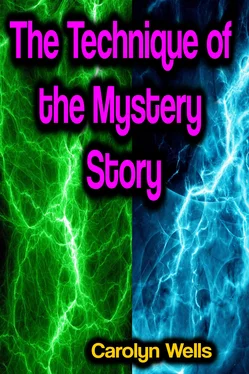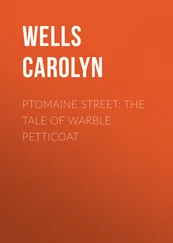But in the plot of a Detective Story, or in the mental makeup of the detective, realism finds little place—as much as you wish in the material details, in the clues, the inquest, or the suspected butler, but the key-note of the story itself is that of pure fiction.
It must seem to be true as fairy stories seem true to children. You must persuade your readers to believe it, as Peter Pan wheedled his audience into believing in fairies; but "Founded on Fact" or "Elaborated from the Records of a Real Detective," is fatal to the interest of a Detective Story.
Let the argument ring true, let the accessories be realistic, let the situations be logical and the conditions plausible; but let the magic of the unreal detective tinkle through it all as fairies dance in real moonlight. Sustain the interest by a subtly woven chain of events that leads unerringly to the climax in a way the uncertainties of real life can never do. Lead your readers on to the re-solution of the problem, whose terms have been stated in logical sequence straight through the book.
The uninitiate say, "You're so fond of detective stories, I suppose you read all the murder trials in the newspapers."
On the contrary, a true lover of detective fiction never reads detailed newspaper accounts of crime.
Why should he? He reads detective fiction for the enjoyment of the complete and finished entertainment therein provided. The statement of the problem, the interesting development, the breathless chase after false clues, the never tiring return to the right track and the final rounding up of the explanatory solution—he knows when he starts he will be disappointed in no particular. Every mystery will be explained and the fun is in trying to explain them himself. As an antagonist at chess, he pits himself against his opponent, the author, and endeavors to foresee and understand his feints and maneuvers. But to whatever degree he succeeds in this, a complete revelation awaits him at the end.
In real life a criminal case reported in the papers gives no assurance of ultimate solution, gives no assurance that all the developments are intentional and go to make up a complete and harmonious whole; that the whole story is so balanced and poised, so coherent and interdependent as to give only satisfaction to its readers.
In a word, the Detective Story of fiction is art; the accounts in the newspapers of the crimes of the day are merely the truthful treatment of material; and the latter, unless seen through the medium of an artist, is not of interest to the lover of the Detective Story.
Another argument against realism in this field of fiction, is the fact that from the nature of its plot the details of a Detective Story are often unlovely. The newspapers delight in realistic description of the gruesome elements of crime. The Detective Story writer in the interests of his art glosses these over, not only because they have no necessary bearing on his theme, "The riddle and its solution," but because they jar on the reader's taste and disturb his economy of attention.
Poe, whose imagination was beyond all bounds, thus speaks of realism:
"The defenders of this pitiable stuff uphold it on the ground of its truthfulness. Taking the thesis into question, this truthfulness is the one overwhelming defect. An original idea that—to laud the accuracy with which the stone is hurled that knocks us in the head! A little less accuracy might have left us more brains. And here are critics absolutely commending the truthfulness with which only the disagreeable is conveyed! In my view, if an artist must paint decayed cheeses, his merit will lie in their looking as little like decayed cheeses as possible!"
And so, the writer of detective fiction pictures as much cheese and as little decay as he may.
The tale of horror, or of gruesome interest, which not only paints the decayed cheese with realism, but with exaggeration, is not a Detective Story, it belongs in another class.
Of course all this applies to Detective Stories which are constructed in harmony with the unwritten but inexorable laws which require the aforementioned qualities. To be sure, plenty of Detective Stories are written which violate every requirement of true technique, but these are not in our argument.
This point is well discussed by Mr. Cecil Chesterton:
"I have read hundreds of such tales which made excellent reading so long as the mystery subsisted, but of which the conclusion was unspeakably weak and far-fetched and in some cases absolutely unintelligible. Nothing is more irritant in a detective story than that even one mysterious circumstance should remain at the end unexplained. Yet the writers appear to imagine that it is quite sufficient if they have thought of some sort of explanation of the central mystery, while a hundred attendant facts, introduced solely to puzzle or mislead the reader, are left without even a suggestion to illumine them.
"Indeed the conclusion ought to be not merely plausible, but in a sense inevitable. The reader ought not indeed to expect it, but he ought to feel afterwards that he ought to have expected it. To explain the problem at the last moment, as is often done, by introducing new circumstances at which he could not possibly have guessed, is merely to leave him labouring under a half-conscious sense of injury and resentment, and rightly so, for he has been cheated into attempting to solve a puzzle which, as it turns out, was for him quite insoluble. In an ideal detective story all the clues to the true solution ought to be there from the first, but so overlaid as to pass unnoticed. If anyone wishes to see how this can be done, let him read attentively the first two or three chapters of 'The Moonstone', by Wilkie Collins. Here the all-important conversation between Franklyn Blake and the doctor is given at length, but in such a context as to appear a mere incident designed to throw light on a phase of Franklyn's temperament."
Recently there has been published a book of short true Detective Stories. ( Adventures of the World's Greatest Detectives, George Barton.) These are of so little interest as to be almost unreadable. The preface says, "Crime in itself, is painful and sometimes repulsive, but a study of the methods of criminal investigation by which difficult problems are solved and the guilty brought to justice is entertaining and may be profitable."
While the foregoing is true, the study of the methods of criminal investigation is not entertaining to the reader, unless written as literature,—indeed, as fiction.
A simple description of a crime and the methods pursued in regard to its investigation make dry reading. The setting, the characters, the atmosphere, of a well-constructed story are necessary to make it entertaining.
The preface we quote goes on to state frankly that the detectives they tell about, work in the most prosaic manner imaginable, but they somehow manage to get results, and that is what counts in the police world.
Here we have merely facts. Their work doubtless is prosaic, but a prosaic account of it entertains nobody.
Let us look at one of the stories of this book. It begins thus:
One crisp December morning Louis Hanier, a Frenchman, the owner of a little wine shop on West Twenty-sixth street in New York City, was found dead in the hallway of his home. The bullet of a .38-caliber revolver was discovered in the man's heart.
He had been murdered.
Well, and suppose he had been. Outside of the impulse of common humanity, the reader has no interest in Louis Hanier. This is not the reader's fault. He cannot be expected to have an interest in a mere name. But the author of detective fiction will arouse such an interest in the reader's mind before announcing the murder.
Next we are informed that:
The problem was to find the man who had committed the crime—to pick him out of the millions of people in New York City. The newspapers were filled with the horrible story. The coroner's inquest attracted the usual crowd of morbid-minded people. The minor police officials became very busy—and accomplished nothing. After the hysterics were over, the puzzle finally made its way to the one man in New York City who had the genius and persistence to solve it.
Читать дальше












